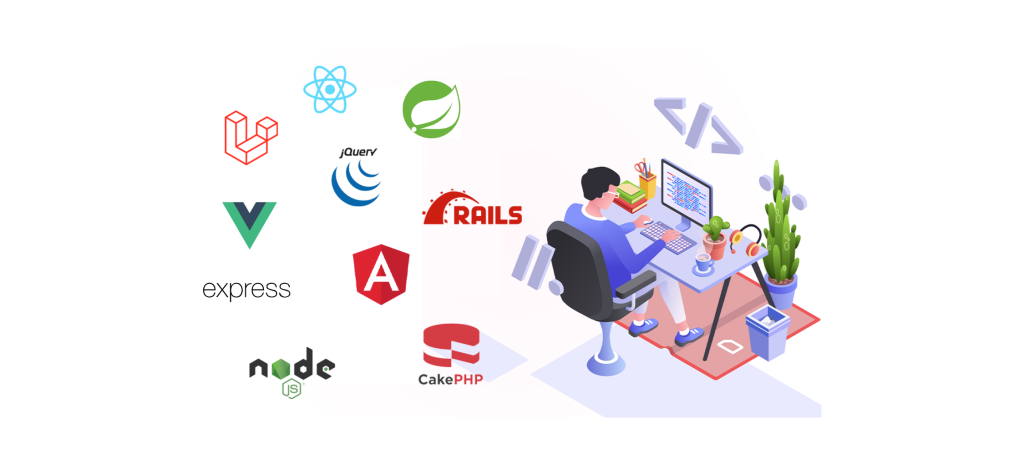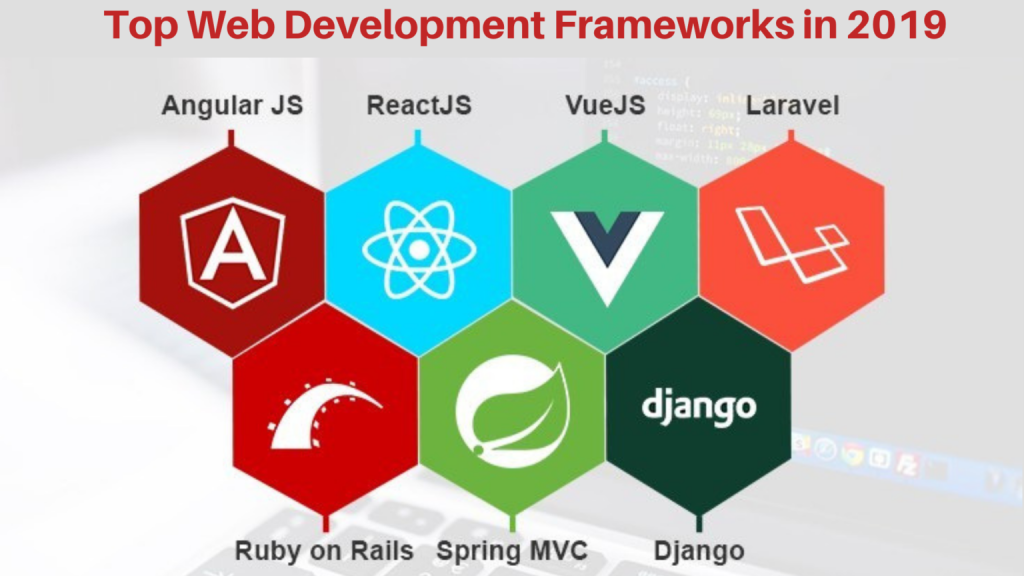
What is Open Source Developing Framework?
Web Development Framework or simply “web framework” is a software framework that offers a set of tools to support developing web applications including web services, web resources, and web APIs (Application Programming Interfaces). Web development framework offers a wide range of prewritten components, code snippets, and entire application templates to ease the work of web developers. Frameworks provide standardized development and design conventions that can be applied and modified to fit the needs of your website. The purpose of a web development framework is to automate the common tasks performed during the development phase. Frameworks give us a place to start so that we can focus on features rather than configuration details.
But, eventually, Why Are so Important?
- Improves Code Efficiency & Reusability: For developers, web frameworks offer a fast, efficient, and responsive coding environment. Frameworks also provide advanced features like hot reloading and live reload, resulting in shorter development cycles.
- Reduce Complexity and Eliminate Error: The framework streamlines the development process and avoids errors and bugs. The framework takes care of all the background details such as data binding and configuration, so you can fully focus on your application.
- Bootstrap Development: A variety of tools and packages are available to help developers jumpstart their development processes. The use of frameworks prevents programmers from writing all scripts from scratch. Even if you don’t have extensive experience in web development, frameworks can help you explore specific features as eagerly as a more experienced developer.
- Reduce Code Length: Frameworks eliminate the need to write lengthy code lines for adding standard functionality to a website. By providing code generation features, frameworks simplify and condense the development process for developers. The predefined codebase allows developers to carry out easy modifications and bootstrapping.
- Reduce Work-Labor: Additionally, frameworks offer tools and functions that enable developers to automate traditional tasks like URL mapping, authentication, caching, etc., which in turn reduces work-labor.
- Better Security: Frameworks have built-in security mechanisms and features that help developers safeguard websites against present and future security threats. Frameworks can be used to protect websites against cyberattacks such as data tampering, SQL injection, DDoS (Distributed denial of service), etc. You can also build custom security specifications for websites using open-source web frameworks.
- Easy Debugging and Maintenance: Most frameworks include built-in testing and debugging capabilities. As a result of code reusability and standard practices, your application is already easier to maintain and understand. You can easily maintain and update your app with features like code completion, unit testing, simultaneous code editing, and more.
Whether it is for the development of a simple static website or a complex SaaS application, there are a multitude of web development frameworks available in the market. To choose the best web development framework for your business, you need to brainstorm and explore the functionalities of each framework. You will likely end up scratching your head; therefore, we are providing you with a list of the 10 best web development frameworks that will make this process super easy and simple.
What are types of developing frameworks?
Web frameworks are generally classified into two categories: front-end (client side) and back-end (server side) frameworks.
- Front-end Frameworks (client side): A client-side framework is used for dealing with user interfaces. The frontend of a web application is the part you see and interact with. A website’s user experience is of paramount importance to any business. Although complex operations and functions may occur in the background, what users experience and see must be seamless. In order to do this, frontend frameworks are used that facilitate the development of interactive, user-centric websites.
- Back-end Frameworks (server side): Frameworks for backend web development are nothing more than libraries of modules and tools that assist developers in creating website structures. The backend consists of the server, the database, and the code that interacts with them. A server-side framework ensures that the website functions smoothly in the background. They simplify the common web development tasks such as URL routing, database interaction, user authentication, enhanced security, push notifications, etc.
Some frameworks allow development on both ends, called full-stack frameworks.
What Are Examples of Developing Frameworks?

After we have declared two or maybe three types of frameworks , I will introduce some good fresh candidates for each.
Front End Development Frameworks
- React
- Angular
- Vue JS
- Ember JS
- JQuery
Back End Development Frameworks
- Ruby on Rails
- Django
- Laravel
- ASP.NET
- Express
Full-stack Development Frameworks
- Angular Angular is a full-stack development framework from Google.
- Django Django is a full-stack development framework for Python.
And, to keep this short and easy, you can surely wait for my next post to explore more about the features about each one, which to use, which is easier to begin and master, and OfCourse what is more suitable for your technical backgrounds.
How to Choose between So Many Alternatives Out There?
But how do you choose the right framework for your project? There are so many options out there, each with its own pros and cons, features and limitations, popularity, and community support.
Here are some factors that you should consider when choosing a web development framework:
- The type and scope of your project. What kind of web application are you building? Is it a simple static website, a dynamic web app, a single-page app, or a complex enterprise system? How big and complex is your project? How much functionality and interactivity do you need?
- The language and skills of your team. What programming language are you most comfortable with? What languages and skills do your team members have? How much time and resources do you have to learn a new language or framework?
- The performance and scalability of your application. How fast and responsive do you want your application to be? How many users and requests do you expect to handle? How easy is it to scale your application with the framework?
- The documentation and community support of the framework. How well-documented and easy-to-use is the framework? How active and helpful is the community around the framework? How easy is it to find answers and solutions to your problems with the framework?
- The popularity and future prospects of the framework. How popular and widely-used is the framework? How stable and reliable is the framework? How often is the framework updated and improved? How likely is the framework to stay relevant and compatible with future technologies?
These are some of the questions that you should ask yourself when choosing a web development framework for your project. Of course, there is no one-size-fits-all answer to this question.
What to Learn Before Using Developing Framework?

Before using an open-source developing framework, it is important to have a good understanding of the following concepts ¹:
1. **Programming languages**: You should have a good understanding of the programming language(s) used by the framework you want to use. For example, if you want to use the Spring framework, you should have a good understanding of Java.
2. **Object-oriented programming (OOP)**: Most open-source frameworks are built using OOP principles. Therefore, it is important to have a good understanding of OOP concepts such as classes, objects, inheritance, and polymorphism.
3. **Design patterns**: Design patterns are reusable solutions to common software design problems. They are used extensively in open-source frameworks. Therefore, it is important to have a good understanding of design patterns such as Singleton, Factory Method, and Observer.
4. **Web development**: If you are planning to use an open-source web development framework such as Ruby on Rails or Django, you should have a good understanding of web development concepts such as HTML, CSS, and JavaScript.
5. **Database management**: Most web applications require some form of database management. Therefore, it is important to have a good understanding of database management concepts such as SQL and NoSQL.
What is open source in software development after all?
OSSD is the process by which open-source software, or similar software whose source code is publicly available, is developed by an open-source software project. These are software products available with its source code under an open-source license to study, change, and improve its design 1.
The development of open-source software is done via open collaboration, and its source code is available for anyone to use, examine, alter and redistribute 2. This decentralized development model distributes source code publicly for open collaboration and peer production known as “the open source way” 2.
Open-source software development has become increasingly popular in recent years due to its many benefits. It allows developers to work together on a project without being limited by geographical location or time zone. It also enables developers to learn from each other and share their knowledge 2.
There are many tools available for open-source software development. Some of the most popular ones include Visual Studio Code, Gitlab, Supabase, Posthog, and Snyk 3.
What are the advantages of using open source software?
There are many advantages to using open-source software. Here are some of the most important ones:
- Cost savings: Open-source software is free to use and distribute, which can save you a lot of money on licensing fees.
- Flexibility: Open-source software is highly customizable and can be modified to suit your specific needs.
- Security: Open-source software is often more secure than proprietary software because it is constantly being reviewed and updated by a large community of developers.
- Reliability: Open-source software is often more reliable than proprietary software because it is developed by a large community of developers who are committed to making it work well.
- Innovation: Open-source software is often more innovative than proprietary software because it is developed by a large community of developers who are constantly working to improve it.
In addition to these benefits, open-source software also provides other advantages such as faster project starts, faster iteration, robust community-driven support, and easier license management.
Some examples of popular open-source software include Linux, Apache, MySQL, WordPress, and Firefox.

I hope this helps! Let me know if you have any other questions.
(1) Open Source for Developers – A Beginner’s Handbook to Help You Start …. https://www.freecodecamp.org/news/a-practical-guide-to-start-opensource-contributions/.
(2) 9 tried-and-true open source frameworks for development. https://www.techtarget.com/searchapparchitecture/tip/9-tried-and-true-open-source-frameworks-for-development.
(3) How to Contribute to Open-Source Projects – A Beginner’s Guide. https://www.freecodecamp.org/news/how-to-contribute-to-open-source-projects-beginners-guide/.
Also:
- https://www.openlogic.com/blog/top-5-benefits-open-source-software
- https://yourtechdiet.com/blogs/brief-about-best-advantages-of-open-source-software-yourtechdiet/
- https://www.heavybit.com/library/article/open-source-software-benefits-advantages/
- https://www.techtarget.com/searchcio/tip/5-open-source-software-problems-and-how-to-manage-them
- https://connectusfund.org/7-main-advantages-and-disadvantages-of-open-source-software




